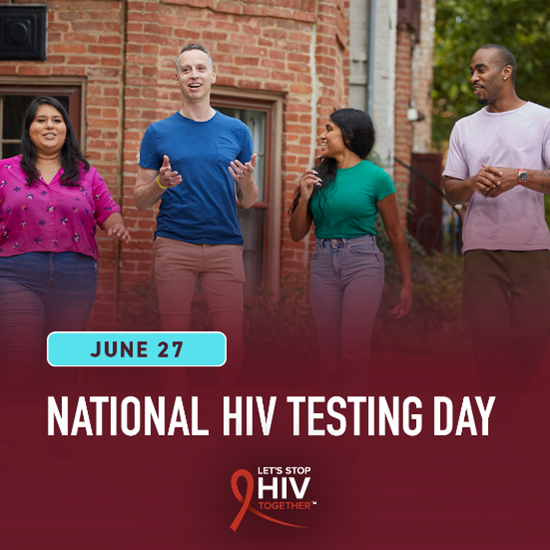National HIV Testing Day—Practice Self-Care with an HIV Test
This June 27, the NIH Office of AIDS Research (OAR) is pleased to join federal agencies, community-based organizations, health advocates, and other partners to observe National HIV Testing Day (NHTD), a key awareness day in the fight against HIV transmission.
Since 1995, NHTD has been a day to raise awareness about the importance of HIV testing; encourage people to know their HIV status; and connect to prevention, care, and treatment services.
This year’s NHTD theme is “HIV Testing is Self-Care.” The World Health Organization defines self-care as “the ability of individuals, families, and communities to promote health, prevent disease, maintain health, and to cope with illness and disability with or without the support of a health care provider.”1 The National Institute of Mental Health (NIMH) made the topic of self-care especially prominent during the COVID-19 pandemic to encourage individual and community action, which is instrumental in protecting and promoting physical and mental health.
The NIH supports research to develop and test new approaches to increase HIV testing. Knowing their HIV status allows individuals to explore potential care options as needed; for example, persons with greater risks of exposure to HIV can connect with ongoing prevention services like preexposure prophylaxis (PrEP). Research supported by the NIMH is underway to better understand and address socioecological factors that facilitate or hinder HIV-related health dynamics, such as access to and uptake of HIV testing and options. This research can lead to a better understanding of the interplay of the social determinants of health, health disparities, and social inequities as they impact HIV-related prevention, treatment, and care. The HIV Prevention Trials Network is conducting a study to develop strategies to increase HIV testing and services that potentially can reduce the high rates of HIV among Black men who have sex with men (MSM) in the southern United States.
Fast, confidential, and safe HIV testing is available in multiple modalities. In addition to HIV testing in nonclinical settings, such as mobile and workplace testing, clinical HIV testing services can offer multi-infection screening and partner notification services. A high-demand, current option includes HIV self-testing that can be administered in a private setting. For example, the Centers for Disease Control and Prevention (CDC) supported an Evaluation of Rapid HIV Self-Testing among MSM Project (eSTAMP): MSM who were mailed HIV self-test kits had more frequent HIV tests, identified more undiagnosed HIV infections, and shared their results more readily with sexual partners, compared to a control group who were not mailed HIV self-test kits. The CDC also has resources to find local self-testing services.
A goal of the National HIV/AIDS Strategy for the United States 2022–2025 is to increase knowledge of HIV status and improve access to effective, evidence-based testing models. The NIH OAR encourages universal HIV testing to ensure that all individuals know their status and can link to appropriate prevention, care, or treatment services. Knowledge of HIV status enables all persons to take care of themselves and protect their loved ones.
The NIH OAR will continue to support research to end the HIV epidemic and improve health outcomes for all people. More information about National HIV Testing Day can be found on HIVinfo.nih.gov.
Maureen M. Goodenow, Ph.D.
Associate Director for AIDS Research and
Director, Office of AIDS Research
National Institutes of Health
1 - World Health Organization. July 2021. WHO Guideline on Self-Care Interventions for Health and Well-Being. Available at https://www.who.int/publications/i/item/9789240052192.
Read the previous blog.
This page last reviewed on January 7, 2026


